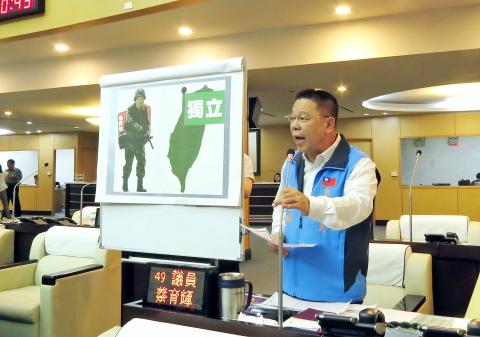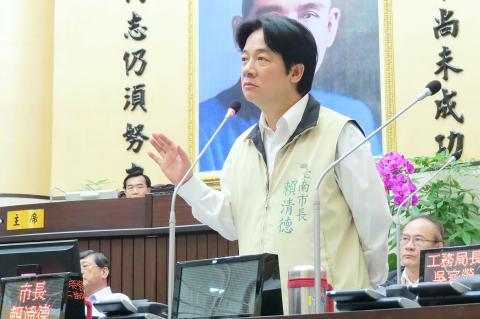The Chinese Nationalist Party (KMT) legislative caucus yesterday accused Democratic Progressive Party (DPP) presidential candidate Tsai Ing-wen (蔡英文) of playing a two-handed strategy to deceive voters into supporting her by pledging to maintain the cross-strait “status quo,” while letting Tainan Mayor William Lai (賴清德) advocate Taiwanese independence.
“Lai [of the DPP] said on Wednesday that he supports independence, but not the use of force. Given that his stance is contradictory to that of his chairperson, the caucus demands that Tsai gives the public a clear explanation on the matter,” KMT deputy caucus whip Lin Te-fu (林德福) told a morning press conference in Taipei.
Accusing Tsai and Lai of collaborating to cheat voters, Lin said that the KMT’s definition of the “status quo” is based on the “three noes” policy of “no independence, no unification and no use of force,” as well as the so-called “1992 consensus,” referring to a tacit understanding between the KMT and the Chinese government that both sides of the Taiwan Strait acknowledge there is “one China,” with each side having their own interpretation of what “one China” is.

Photo: Tsai Wen-chu, Taipei Times
Refusal to accept the “1992 consensus” alone could enrage the leadership in China, Lin said.
“The KMT really wants to see Taiwanese being able to live and work in peace on this island,” he said.
KMT caucus whip Lai Shyh-bao (賴士葆) said there is a deeper meaning behind Lai’s declaration of support for independence on Wednesday, as it was the eighth anniversary of the DPP’s passage of the “Normal Country Resolution.”

Photo: Tsai Wen-chu, Taipei Times
The resolution advocates renaming the country “Taiwan” and the enactment of a new constitution, Lai Shyh-bao said, adding that the mayor’s comments showed Tsai’s pledge to maintain the “status quo” was nothing but a ploy to gain votes.
“Having an influential politician like William Lai make such a politically sensitive statement on this particular date ... we suspect that they are playing a two-handed strategy,” Lai Shyh-bao said.
“We believe Tsai is responsible for attracting swing voters with her promise of maintaining the ‘status quo,’ while the mayor is in charge of reassuring ‘deep-green’ voters by reiterating the party’s pro-independence stance,” he said.
He added that the mayor might have made the statement in an attempt to shift public focus away from the escalating outbreak of dengue fever in the south.
Citing a July survey conducted by the Mainland Affairs Council (MAC), KMT Legislator Wu Yu-sheng (吳育昇) said that 72.2 percent of respondents supported maintaining the “status quo” based on the “three noes” policy.
“That means the mayor’s claim that independence has received the maximum consensus among Taiwanese is nonsense and an outright lie,” Wu said.
MAC Minister Andrew Hsia (夏立言) said that the government’s stance has always been clear: that the cross-strait status of “no independence, no unification and no use of force” be maintained based on the “1992 consensus,” the principle of “one China, with different interpretations” and the Constitution.
“Cross-strait relations have stabilized and prospered over the past seven years. We hope that everyone will cherish this stance,” Hsia said.
KMT presidential candidate Hung Hsiu-chu (洪秀柱) said William Lai has remained unwavering in his support of Taiwanese independence.
“On the contrary, Tsai has repeatedly shifted her stance on the issue, from the 1999 “special state-to-state” theory and reference to the Republic of China [ROC] government as “a government-in-exile,” to the DPP’s vows to safeguard the existence of the ROC,” Hung said.
"I do not know whether Tsai and the mayor have some sort of tacit agreement, or are they playing ‘good cop, bad cop,’” Hung added.
Asked whether his remarks could impact the tourism industry, William Lai said in Tainan that the country must seek to be self-reliant, as overdependence on others would always result in it being held over a barrel.
“The DPP’s ‘1999 Resolution on Taiwan’s Future’ states that Taiwan is an independent, sovereign state called the ROC [Republic of China] and that its future must be decided by its own people,” the mayor said.
Tsai said she has made her cross-strait policy platform clear.
“As a presidential candidate, I have made my cross-strait policy idea very clear during my speech at the Center for Strategic and International Studies in the US,” Tsai told reporters. “It is to push for peaceful and stable development of cross-strait relations in line with public opinion under the current constitutional framework of the ROC.”
She added that William Lai’s remarks should not be overinterpreted, as the mayor only seeks mutual understanding and peaceful coexistence across the Strait.
Asked if the mayor’s remarks would have any impact on the DPP, Tsai said that sometimes, it is just a “question of definition,” adding that the consensus in Taiwanese society is in line with her ideas.

The CIA has a message for Chinese government officials worried about their place in Chinese President Xi Jinping’s (習近平) government: Come work with us. The agency released two Mandarin-language videos on social media on Thursday inviting disgruntled officials to contact the CIA. The recruitment videos posted on YouTube and X racked up more than 5 million views combined in their first day. The outreach comes as CIA Director John Ratcliffe has vowed to boost the agency’s use of intelligence from human sources and its focus on China, which has recently targeted US officials with its own espionage operations. The videos are “aimed at

STEADFAST FRIEND: The bills encourage increased Taiwan-US engagement and address China’s distortion of UN Resolution 2758 to isolate Taiwan internationally The Presidential Office yesterday thanked the US House of Representatives for unanimously passing two Taiwan-related bills highlighting its solid support for Taiwan’s democracy and global participation, and for deepening bilateral relations. One of the bills, the Taiwan Assurance Implementation Act, requires the US Department of State to periodically review its guidelines for engagement with Taiwan, and report to the US Congress on the guidelines and plans to lift self-imposed limitations on US-Taiwan engagement. The other bill is the Taiwan International Solidarity Act, which clarifies that UN Resolution 2758 does not address the issue of the representation of Taiwan or its people in

US Indo-Pacific Commander Admiral Samuel Paparo on Friday expressed concern over the rate at which China is diversifying its military exercises, the Financial Times (FT) reported on Saturday. “The rates of change on the depth and breadth of their exercises is the one non-linear effect that I’ve seen in the last year that wakes me up at night or keeps me up at night,” Paparo was quoted by FT as saying while attending the annual Sedona Forum at the McCain Institute in Arizona. Paparo also expressed concern over the speed with which China was expanding its military. While the US

SHIFT: Taiwan’s better-than-expected first-quarter GDP and signs of weakness in the US have driven global capital back to emerging markets, the central bank head said The central bank yesterday blamed market speculation for the steep rise in the local currency, and urged exporters and financial institutions to stay calm and stop panic sell-offs to avoid hurting their own profitability. The nation’s top monetary policymaker said that it would step in, if necessary, to maintain order and stability in the foreign exchange market. The remarks came as the NT dollar yesterday closed up NT$0.919 to NT$30.145 against the US dollar in Taipei trading, after rising as high as NT$29.59 in intraday trading. The local currency has surged 5.85 percent against the greenback over the past two sessions, central